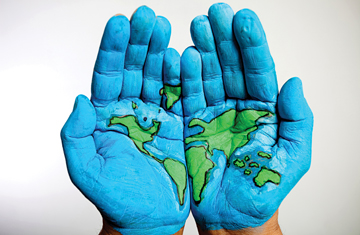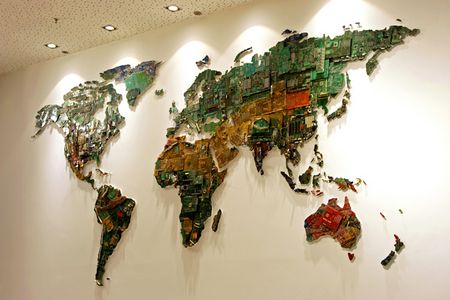
Never before has the world faced so many major challenges, from the bloody war in Syria to the intractable conflict in Ukraine, from the Ebola epidemic to aviation accidents, from tensions over sovereignty disputes in the South China Sea and East China Sea to the pro-democracy protests in Hong Kong. In this complex context, the strategies and responsibilities of major powers cannot be overlooked.

US-Russia: The war in post-Soviet space
Twenty-five years after the end of the Cold War, for the first time, US-Russia relations have nearly returned to the tense state of the bipolar order era, primarily due to the conflict in Ukraine, a former Soviet republic. Once again, conflict in Europe has drawn the US into a difficult position. Ukraine appears to be the last "barrier" in the eastward expansion strategy of the EU and NATO, and the only "buffer zone" between Russia and the EU. Therefore, both sides want Ukraine to align itself with them.
In the Ukraine crisis that began in late 2013, the US seems to have gained more than it lost. First, the US succeeded in pulling Ukraine away from Russia's "orbit," the two countries are no longer "brothers," and Ukraine is drawing closer to the US and the West. Second, the US-European alliance was strengthened, and NATO's power was enhanced as all members agreed to increase defense spending to 2% of GDP. NATO also agreed to establish a rapid reaction force, deployed in Eastern European member states. Through the Ukraine crisis, the US also succeeded in maneuvering European forces and finances, containing Russia, saving resources, gaining an advantage in negotiations for the Transatlantic Trade and Investment Partnership (TTIP), and achieving initial success with its "energy weapon."
In the overall Ukraine crisis, and in Russia-US relations in particular, Russia seems to be "losing more than it gains." The only thing Russia has gained is the relatively inexpensive recovery of Crimea from Ukraine. However, the challenges Russia faces are significant. Politically, Russia's actions have caused dissatisfaction and concern among most Eastern European countries. The trust between Russia and Europe, built over 25 years, has vanished, and the Ukraine crisis has alienated Eastern European countries from Russia, uniting them around the US and the EU.
Economically, US and EU sanctions are making things even more difficult for Russia. The ruble has depreciated drastically, and economic growth has fallen below 1%.
Strategically, Russia's long-standing pursuit of establishing a unified Eurasian Union, limiting US interference, and expanding its influence in the post-Soviet space appears to have failed. As a result, Russia has had to adjust its strategy, shifting its focus toward Asia.
Russia-China: A new model of great power relations.
Although not located in Europe, developments on the "old continent" have a strong influence on Russia-China relations. The catalyst for warming Russia-China relations is the Ukraine crisis. In fact, the Ukraine crisis has accelerated Russia's eastward shift. The two countries share many similarities, such as both undergoing transitions, seeking suitable development paths, and possessing similar philosophies and methods of governing. President Putin's visit to Beijing for the 22nd APEC Summit and meeting with President Xi Jinping marked the fifth meeting between the two leaders in 2014. According to President Xi Jinping, these summit meetings "cultivate friendship and cooperation between China and Russia" and are yielding positive results, while President Putin considers them a "new impetus" for the development of bilateral relations.
Russia - EU: The Cold War seems to be returning.
2014 was the most turbulent year in EU-Russia relations. Once again, the spark of war ignited in Europe, a region already marked by two World Wars and religious wars throughout history.
Unlike the US and Russia, 2014 was a year in which the EU only achieved half of its goals. As a party to the Ukraine dispute with Russia, the EU eventually managed to draw Ukraine to its side, but at a very high price. Economically, unlike the US, the EU-Russia economic relationship is very close, and Russia is the EU's third-largest trading partner. Furthermore, the EU is heavily dependent on Russian energy, with Russia supplying up to 30% of the EU's gas needs. For these reasons, the sanctions imposed on Russia by the EU are, in effect, self-punishment. In the first six months of 2014, trade between the EU and Russia decreased by €1.31 billion, and Russian exports to the EU fell by 12%. In terms of security, although no direct conflict has occurred between the EU and Russia, tensions are looming over Eastern Europe. Faced with the risk of conflict breaking out, Eastern European NATO member states have agreed to establish a rapid reaction force to deal with any unforeseen circumstances.
China and Japan: The conflict over the Diaoyu/Senkaku Islands.
While Europe was preoccupied with the Ukraine crisis, East Asia was shrouded in the territorial dispute over the Senkaku/Diaoyu Islands between Japan and China. Relations between the two countries suddenly became strained in 2012 when Prime Minister Shinzo Abe's predecessor, Yoshihiko Noda of the Democratic Party of Japan (DPJ), decided to nationalize the Senkaku/Diaoyu Islands to prevent the ultra-nationalist Shintaro Ishihara, who later became mayor of Tokyo, from purchasing them. However, this decision led to unprecedented tension between Japan and China.
In response, in November 2013, China decided to establish an Air Defense Identification Zone (ADIZ) in the East China Sea. This action demonstrated China's firm insistence that Japan and the international community recognize the archipelago as sovereign Chinese territory. Subsequently, Prime Minister Shinzo Abe reinterpreted Article 9 of Japan's pacifist constitution, which allows the country to exercise the right of collective self-defense by deploying military forces to neighboring countries to protect its interests if threatened, established a National Security Council, increased defense spending, and published a white paper criticizing the Chinese threat.
After two years without any contact, in November 2014, Prime Minister Shinzo Abe and President Xi Jinping met for the first time for 30 minutes on the sidelines of the APEC summit in Beijing. However, their cold handshake indicated that the two countries still lacked common ground on this issue.
The fight against IS: No "light at the end of the tunnel" yet.
The US war against the self-proclaimed Islamic State (IS) is mired in an inescapable quagmire. On September 10, 2014, President Obama declared that the US would work with friends and allies to weaken and ultimately destroy the IS terrorist organization.
To date, the "monster ISIS" is the most heavily funded and successful terrorist organization in history, controlling over 90,000 square kilometers of Iraqi territory with over 8 million inhabitants, including many major cities, and earning an average of over $1 million per day from the oil trade. What sets it apart is that this massive terrorist army, ranging from 10,000 to 80,000 jihadists, comes from over 80 different countries, including the US, UK, France, Belgium, Maldives, Chile, Norway, and has close ties to powerful forces in Iraq and the region, such as tribal groups, former Baal Party officers, and disgruntled Sunni elements.
Experts believe that ISIS now poses a far more dangerous threat to US national security than al-Qaeda did since 9/11. The biggest dilemma for the US is the lack of a clear and transparent strategy. By unilaterally authorizing attacks on ISIS in Syrian territory "at a time and place" of its own choosing, the Obama administration lost credibility in the eyes of the international community. There is deep division among countries regarding the US strategy against ISIS because they don't truly understand the US's real objective: Syria or ISIS. Iran, Russia, and Syria have strongly opposed and expressed concerns about the true motives behind this strategy. The US could wear down ISIS forces with drones and cruise missiles, even temporarily neutralizing their operations. But to completely destroy ISIS, the US must cooperate with the Syrian government. This is the crucial point for the US, as US officials explain that "fighting the common enemy, ISIS, cannot make the Syrian government an ally of the US."
2014 ended on a somber note. Never before has the world situation been as complex and volatile as it was this year. Fortunately, on the eve of 2015, the world witnessed an event that had been awaited for over half a century: the official announcement by the United States and Cuba of the normalization of relations between the two countries. Hopefully, with such good news, 2015 will be a brighter year for politics and international relations.
Author:Assoc. Prof. Dr. Pham Quang Minh
Newer news
Older news